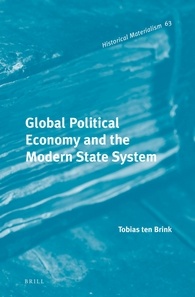Tobias ten Brink, Goethe University Frankfurt
In Global Political Economy and the Modern State System Tobias ten Brink contributes to an understanding of the modern state system, its conflicts, and its transformation. In contrast to the political attractiveness of optimistic theoretical approaches to globalisation, this book demonstrates how an analytical approach rooted in Global Political Economy (GPE) helps to explain both the tendencies towards integration and towards rivalry in international relations. By way of a historical reconstruction of different ‘world order’ phases in the twentieth century, ten Brink analyses multiple, phase-specific variations of socioeconomic and geopolitical conflicts that are significant for the modern capitalist world system.
Revised edition of Geopolitik. Geschichte und Gegenwart kapitalistischer Staatenkonkurrenz, Verlag Westfälisches Dampfboot, Münster, 2008.
Biographical note
Tobias ten Brink, Ph.D. (2007), is a senior researcher at Goethe University in Frankfurt. In addition to several monographs, such as Chinas Kapitalismus. Entstehung, Verlauf, Paradoxien (Campus, 2013), he has published numerous articles on comparative capitalisms, international relations and China.
Readership
All interested in international relations and international political economy, and anyone concerned with an analysis of rivalries in the global political economy.
Reviews
“Ten Brink develops his approach through a systematic integration of temporality and spatiality, paying special attention to the logics of accumulation and territorial conflict, the demands of the expanded reproduction of capital and those of the self-reproduction of individual states. This is possible because of the careful distinction between economics and politics and a rigorous analysis of their operational autonomy and material interdependence within a world order dominated in different ways by the logic of capital accumulation. I strongly recommend this book to all those interested not only in the history of critical political economy but also the dynamics of the contemporary world market.”
— Bob Jessop, University of Lancaster
“The greatest merit of this book is how it systematically connects central concepts of the political economy of the global economic system with the attempt to progressively explicate historical and contemporary geopolitical relations of competition. At the same time, ten Brink is very conscious of the fact that political economy in its classical form cannot be maintained and that it needs to be theoretically advanced through the sophisticated introduction of concepts from law and political science.”
— Axel Honneth, University of Frankfurt
“This work is an important contribution to current debates on modernity and an impressive effort to combine theoretical, historical and sociological perspectives. Tobias ten Brink shows that geopolitical analysis is an indispensable corrective to work on varieties of capitalism, and an effective antidote to both liberal and Marxist versions of economic reductionism.”
— Johann P. Arnason, La Trobe University, Melbourne/Charles University, Prague
“In this encyclopaedic work Tobias ten Brink gives a state-of-the-art assessment of current attempts seeking to bridge the gap between the discipline of International Relations and political economy theories of capital and the state. This gap, which the classical theories of imperialism only covered incompletely, today again demands the attention of all those pondering the possibilities for reordering foreign relations towards an equitable format.”
— Kees van der Pijl, University of Sussex
Table of contents
Acknowledgements
Preface by Bob Jessop
Introduction
Organisation of the book
PART ONE: PERIODS OF THEORISING CONFLICT IN THE MODERN STATE SYSTEM
I. Critical-liberal, Marxist and neo-Weberian approaches
II. Power-politics and (Neo-)Realism within the field of International Relations
III. Deficits and Desiderata for future research
1. Preliminary summary
PART TWO: A GPE FRAMEWORK FOR EXPLAINING GEOPOLITICS
I. Foundations for analysing capitalism
1. Analyses of the capitalist mode of production
2. Structural features of capitalism
II. Capitalism as a globally fragmented system across space and time
1. Combined and uneven development, relations of space and time, and the ‘international’
2. The dynamic of the global economic process of accumulation
3. The dynamic of the international state system
4. Considerations on various forms of competition
III. Historical phases of the world order and the periodisation of socio-economic and geopolitical power relations
1. Structural features, phases and constellations
2. Hegemonic and non-hegemonic phases of world order
3. Phases of socio-economic development
4. Phases of statehood
PART THREE: MARKET-LIBERAL STATISM: CONTEMPORARY GEOPOLITICAL PHENOMENA
I. The balance between soft and hard geopolitics
1. ‘Democratic wars’
2. Excursus: International law within fragmented capitalism
II. Geopolitical and economic competitive relations
1. The aspirations and realities of US empire
2. The EU and the US: A conflict-laden partnership
3. China and the US: A new cold war?
Summary
Bibliography
Index

